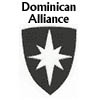
To open a PDF document, you need Adobe Acrobat Reader,Click the icon
follow the prompts. It is free, safe and secure.
|
Sustainability
for All
|
|
Practical
Action for a Fragile Planet
ideas and action on sustainability from the
Dominican Alliance
|

Related Links:
EnergyStar
click
on
Home Improvements
|
|
“Lower is better, put on a sweater.”
Minimize your use of ventilation fans such as bathroom and
kitchen in winter.
Regularly replace air filters
Set back the thermostat when asleep or away.
Do an energy audit
Don't heat areas not regularly used.
Open blinds & curtains on the sunny side. |
December Cleaning
Products
When you clean, go green.
Refuse to purchase any anti-bacterial soaps. They destroy good bacteria
as well as harmful and are promoting dangerous levels of antibiotic-resistance
in humans.
The Clean Water Fund, a non-profit organization, estimates the average
American uses 40 lbs of unsafe household cleaners each year. These
toxins end up in our bodies, the air, the soil, the oceans, and in
our own drinking water.
Cleaning agents with chlorine bleach release dioxins into the air
and water stream. Dioxins are the most harmful of manufactured carcinogenic
chemicals. A safe alternative is hydrogen peroxide (3% solution).
There are many resources for mixing your own alternative cleaners,
using inexpensive, healthier choices like white vinegar, borax, washing
soda, salt, and hydrogen peroxide.
One chlorine-free scouring cleanser is Bon Ami. One plant-based soap
(as opposed to most soaps which are petroleum-based) is Dr. Bronners.
Clean & Green by Annie Berthold-Bond
|
www.care2.com
Green Cleaning Network
|
|
|
Start a fashion. Make
cloth bags a passion.
- Plastic doesn’t biodegrade. Each year Americans “throw
away” 100 billion bags.
- Less than 1% of plastic bags world wide are recycled. Only
0.6% in the U.S.They are made of petroleum or natural gas.
- Huge numbers of birds and marine mammals die from ingesting
or getting caught in them.
- China, South Africa, Ireland are among several nations instituting
taxes or outright banning their use. San Francisco has banned
them in the U.S.
Challenge yourself to go one week without accumulating
any new plastic bags. |
Worldwatch.org
PlasticBagRecycling.org |
October : Mountaintop
Electricity |
Ilovemountains.org
Stopmountaintopremoval.org
Mountainjusticesummer.org |
Mountain
tops roll.
All for the coal.
- Coal is the country’s dirtiest source of electricity
and climate changing greenhouse gases.
- Burning coal puts carbon, mercury, and other pollutants into
the atmosphere, contributing to higher incidences of asthma in
children.
- For every one ton of coal extracted from the mountains, 14
tons of debris are dumped, burying streams and filling the valleys.
- The cost to the mountain eco systems and local communities
includes the constant noise and shaking of the blasting, denuded
mountainsides, flooding, and tons of toxic slag pools.
- Switching one 100 watt incandescent light bulb to a compact
fluorescent cuts the equivalent of 100 lbs of coal. The
CFL uses 75% less energy and can save you $30-60 dollars over
its lifetime.
Challenge yourself to conserve energy in one new way. |
| September
- Energy and Transportation |
|
Be cool! Use less fuel!
- Plan trips carefully, combine several errands.
- Use smart driving techniques: slow starts, no sudden braking,
use cruise control,
don’t speed.
- Carpool when possible.
- Have your car serviced on a regular basis, keep tires properly
inflated.
- Rid car of unnecessary weight.
- Don’t idle engine for more than a minute, turn it off.
|

websites:
www.ucsusa.org
and
click on vehicles
www.care2.com
and click on
transportation |
August - Buying
locally |
|
Wherever you roam, eat close
to home.
- Food travels an average of 1500 fossil-fueled miles to reach our
plates.
- Our food purchases consume tremendous amounts of oil to fertilize,
irrigate, harvest, package, ship, and advertise.
- Eat less meat. Switch to vegetables one day per week.
- Join a CSA or support a local farmers market.
- Ask local restaurants and grocers to offer locally grown foods.
- Read Barbara Kingsolver’s Animal, Vegetable, Miracle
|

Websites:
www.localharvest.org
sustainabletable.org |
July - Lawn
Care |
|
Don’t feed. Don’t mow.
Let grow.
- Over 100 millions pounds of chemicals are dumped on U.S. lawns
each year.
- The US uses over 800,000,000 gallons of gas annually in lawn
mowers.
- Mow only when needed. Set mower height to 3 inches and
return grass clippings to lawn.
- Keep mower blades sharp to prevent harming grass and inviting
disease.
- Plant native grass and flowers, which require less water and
no fertilizer.
- Plant edible landscape instead of grass.
|

Web sites:
www.green-conscience.com
www.richsoil.com
|
|






